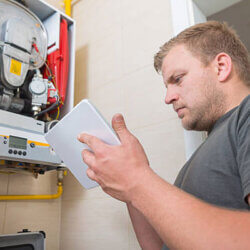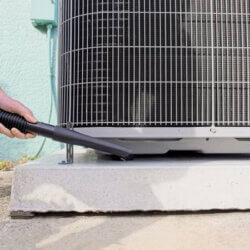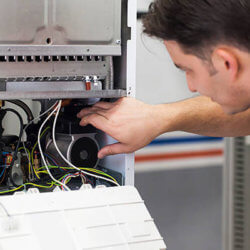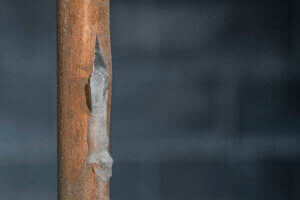
Did you know that severe winter weather can seriously affect your home’s plumbing? When the temperatures go down, your pipes can freeze, crack, or even burst. So the question arises – how can we prevent frozen pipes during the peak winter season?
There are several precautionary steps you can take to prevent frozen pipes in your home. The biggest tip is to ensure that your HVAC system is running efficiently to prevent breakdowns or hot and cold spots during extreme winter weather. In case of problems, the heating and air conditioning experts at Galmiche & Sons in St. Louis are here to lend their expert advice and assistance.
With that, let’s explore why frozen pipes occur in the first place.
Frozen Pipes – Phenomenon Explained
Unlike other fluids, water usually expands when it freezes. Given this property, it is obvious why pipes (both plastic and metal) undergo a tremendous amount of strain when frozen. The problem of frozen, broken, or cracking pipes becomes particularly prominent during the winter weather when water is constantly melting and freezing.
Tips to Prevent Frozen Pipes
With the onset of winter, it becomes important to monitor your home’s plumbing system. Here are some great tips and tricks for preventing frozen pipes during the winter season:
- Maintain consistent warm temperatures in your home: Probably the easiest way to prevent frozen pipes in your home is by increasing the indoor temperature and keeping it at a consistent level. Make sure that your thermostat is set at the same level during both day and night. When warm air circulates through your house consistently, your pipes are less likely to freeze, and you shouldn’t have to undertake any costly plumbing repairs.
- Inspect your walls, windows, and doors for any cracks: If the walls of your house have any cracks or openings, cold winter air can enter your house, rendering your home heating system useless. Before the temperatures drop, look for any such cracks or leaks and fill them with sealants.
- Use supplemental heating systems: Frozen pipes in any area of the house can cause problems. But some areas of your house, like the garage or the basement, are not equipped with an HVAC unit, which is why the problem of frozen pipes is more common here. To prevent this issue, consider adding supplemental heating systems in these areas if needed.
- Ensure heating system maintenance: This follows directly from the first point. You know how important home heating systems are for maintaining a consistent temperature. To ensure that they continue to perform effectively and to prevent any major breakdowns, it is important to ensure regular maintenance of the unit.
- Insulate your pipes: Besides ensuring the insulation of your house, it is also a good idea to insulate any pipes that run along the exterior walls. A sudden drop in temperature can put these pipes at risk. By insulating them, you can prevent frozen pipes.
- Let water trickle from your taps: This final tip to prevent frozen pipes is important especially if your HVAC system fails or during extreme cold weather. Turn on your faucets and let the water run through the pipes at a trickle. This will prevent them from freezing, especially as the temperatures continue to go down.
Contact Galmiche & Sons for HVAC Maintenance & More
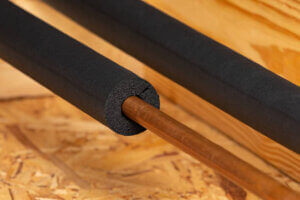
With these tips, you should be able to prevent frozen pipes in your home and keep your HVAC system in perfect working condition. Our goal here, at Galmiche and Sons, is to educate our clients with the best home maintenance tips to ensure their home comfort all year round.
Want to schedule maintenance service for your heating unit or need help repairing a breakdown? Reach out to Galmiche & Sons in St. Louis today at 314-993-1110 and book an HVAC maintenance or service appointment!



